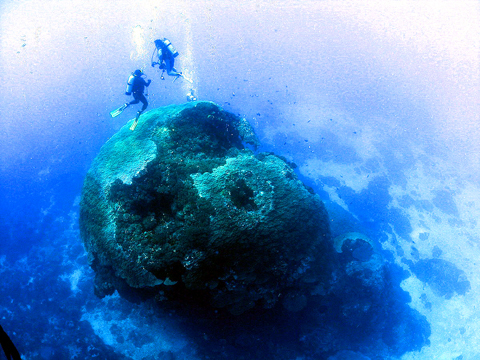The coral reefs north of Green Island (綠島), a popular vacation spot off the coast of Taitung where political prisoners were once held, are being threatened by sheets of black sponge that endanger marine life and the ecology around the volcanic island, an expert said on Wednesday.
Calling for immediate action to stem the spread of what he called the “black disease,” Allen Chen Chen (陳昭倫), an assistant research fellow at Academia Sinica’s Biodiversity Research Center, warned that the sponges were growing at a rate of about 50 percent a year.
The coral reefs off Kungkuan (公館), on the island’s northeast coast, are the most seriously affected, with 10.91 percent covered by the black sponge, Chen said in a recent study of the Green Island “black plague.”

PHOTO PHOTO COURTESY OF ALLEN CHEN
ORIGIN UNKNOWN
The study found that the black sponges were filled with blue-green algae unlike any other bacteria group seen in local waters, Chen said.
Their origin remained to be determined, he said.
“One thing is certain, however,” he said. “The most severe damage has occurred near the most densely populated areas of the island,” said Chen, who heads a research team that has been commissioned to investigate the matter.
Apart from Kungkuan, the coral reefs off Chaikou (柴口), in the northern part of the island, Shilang (石朗), in the west, and Tabaisha Bay (大百沙灣), in the southwest, have also been affected, Chen added.
Green Island is surrounded by one of Taiwan’s major coral habitats. Chen said he had recorded 168 stone coral strains, six strains of hydrocorals, one organ-pipe coral strain, one blue coral strain and 27 strains of soft corals in the area.
HUMAN THREAT
The diverse coral habitat, however, is under threat from intense human activity, as more than 300,000 tourists visit the island every year.
A significant volume of wastewater is pumped into the sea, Chen said.
To prevent further anthropogenic damage to the coastal waters and the rich and diverse marine ecology supported by the coral reefs, the scientist suggested that a wastewater treatment plant be built on the island.

CHANGING LANDSCAPE: Many of the part-time programs for educators were no longer needed, as many teachers obtain a graduate degree before joining the workforce, experts said Taiwanese universities this year canceled 86 programs, Ministry of Education data showed, with educators attributing the closures to the nation’s low birthrate as well as shifting trends. Fifty-three of the shuttered programs were part-time postgraduate degree programs, about 62 percent of the total, the most in the past five years, the data showed. National Taiwan Normal University (NTNU) discontinued the most part-time master’s programs, at 16: chemistry, life science, earth science, physics, fine arts, music, special education, health promotion and health education, educational psychology and counseling, education, design, Chinese as a second language, library and information sciences, mechatronics engineering, history, physical education

DEADLOCK: As the commission is unable to forum a quorum to review license renewal applications, the channel operators are not at fault and can air past their license date The National Communications Commission (NCC) yesterday said that the Public Television Service (PTS) and 36 other television and radio broadcasters could continue airing, despite the commission’s inability to meet a quorum to review their license renewal applications. The licenses of PTS and the other channels are set to expire between this month and June. The National Communications Commission Organization Act (國家通訊傳播委員會組織法) stipulates that the commission must meet the mandated quorum of four to hold a valid meeting. The seven-member commission currently has only three commissioners. “We have informed the channel operators of the progress we have made in reviewing their license renewal applications, and

The High Prosecutors’ Office yesterday withdrew an appeal against the acquittal of a former bank manager 22 years after his death, marking Taiwan’s first instance of prosecutors rendering posthumous justice to a wrongfully convicted defendant. Chu Ching-en (諸慶恩) — formerly a manager at the Taipei branch of BNP Paribas — was in 1999 accused by Weng Mao-chung (翁茂鍾), then-president of Chia Her Industrial Co, of forging a request for a fixed deposit of US$10 million by I-Hwa Industrial Co, a subsidiary of Chia Her, which was used as collateral. Chu was ruled not guilty in the first trial, but was found guilty

Taiwan People’s Party (TPP) Chairman Huang Kuo-chang (黃國昌) yesterday appealed to the authorities to release former Taipei mayor Ko Wen-je (柯文哲) from pretrial detention amid conflicting reports about his health. The TPP at a news conference on Thursday said that Ko should be released to a hospital for treatment, adding that he has blood in his urine and had spells of pain and nausea followed by vomiting over the past three months. Hsieh Yen-yau (謝炎堯), a retired professor of internal medicine and Ko’s former teacher, said that Ko’s symptoms aligned with gallstones, kidney inflammation and potentially dangerous heart conditions. Ko, charged with